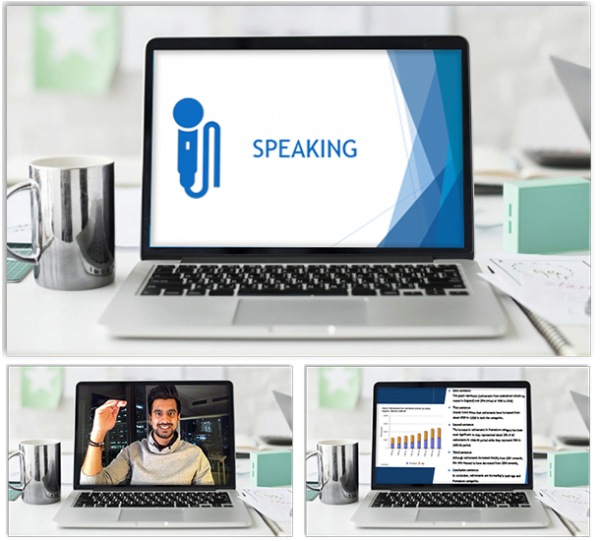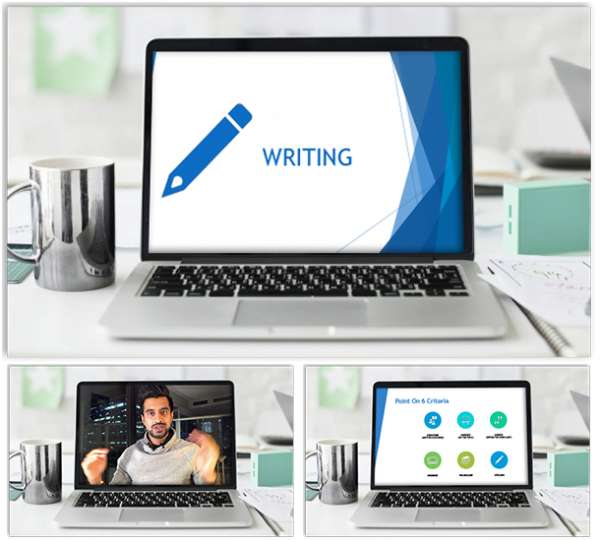In today’s article, you will be learning 6 hacks that will help you to get 8+ in your IELTS speaking.
These are the hacks that I first compiled when I took my IELTS exam and I got 8/9 in the IELTS speaking.
Since then, in the last three years, more than 2500 students have used my method and aced their IELTS speaking.
I can’t wait to share it with you!
Once you have aced yourself with these speaking hacks and you walk into the room of the IELTS speaking exam, you’ll feel confident.
By the way, I also have one of the most popular courses on IELTS online preparation called Ultimate Guide to Hacking IELTS.
Let’s get into it!
1. 30-Seconds Mindset
This 30-second mindset is going to change how you look at IELTS speaking.
Chances are that currently you look at IELTS Speaking as this grilling 15 to 20 minutes interview in which you’ll be sweating and the examiner will be asking you questions for which you have no idea how to answer.
But, this 30-Seconds mindset is going to flip that script in your head.
Here is how it goes.
For every question that is asked all you have to do is answer for 30 seconds.
How long are 30 seconds? Just 2-3 sentences.
Follow this for any question you’re asked.
For part one questions like where do you live, tell me about yourself, or what are your hobbies – you don’t have to think if the answer should be short or long. You just have to think that it should be 30 seconds long.
Then in part two, you feel like you have to answer for two long minutes. Honestly, if you ask me a question like what I think about climate change and expect me to speak for two minutes then I won’t be able to.
Nobody can speak for two long minutes on any random topic.
But there is a trick here. With the part two questions, you also have four prompts.
For example: tell me about climate change is followed by how climate change is affecting the world or what do you think you should be doing to fight climate change and so on.
All you have to do is look at each small question as a separate question and answer that for 30 seconds.
My goal here is to help you understand that no matter what the question is, you have to go with the mindset that you have to answer for just 30 seconds.
With some practice, you will be able to look at any question and see what 30 seconds feel like.
In reality, it can be 20 seconds or it can be 40 seconds. Sometimes you’re in the flow so you can go on for as long as you want. But 30 seconds should be in your mind.
2. Simple Over Complex
Most people go into the IELTS interview and treat it like a job interview.
They think that intellect, vocabulary, and persona matter and you have to impress the other person. But, that’s false.
All you have to know is that how you say a particular thing matters, not what you say.
You just have to speak in a very simple and structured manner about the things they are asking.
What does it look like in practice?
It means that you don’t have to go in there with the mindset that you need to have the best vocabulary and you need to create these complicated sentences.
Instead, it’s the opposite.
Even if you have the most basic of vocabulary and you’re answering in bullet points, you are good to go.
For example, if they ask you to talk about an experience that you really enjoyed you can say something like: I’m going to speak about the time that I went to Thailand and there are three reasons I enjoyed it; the first reason is this, the second reason is that, and the third is something else.
That’s it. The goal here is that you have to be extremely simple and very structured.
I do want to point out here that if you’re already so good that you can just get up from the bed, go into the interview, and ace with an 8 band and you want to have the 9 perfect band then vocabulary and all the other complicated stuff matters.
But for now, to get an 8 band in IELTS speaking, all you have to do is tell yourself that it’s simple over complex that matters.
3. Fluency Does Not Mean Fast
Most people think that if they speak very fast as native speakers do then they are speaking well.
But it’s the opposite.
Look at the people who have the largest following in the world. Those are the politicians.
Think of Barack Obama or any other politician that is very famous in your country.
These are the speakers who are influencing a large number of people and they speak slowly – with pauses.
So, fluency is first thinking about what you have to say and delivering that in a very simple and structured manner.
4. Accent Does Not Matter
Because IELTS is a British test we have started thinking that if we’re speaking in a Western accent, we’ll get a good score.
I have seen students after students trying to ramp up their accents if they’re not born in a Western country.
Whichever race you’re from, you’ll have a different accent and the examiner in your region is trained to understand your accent.
So, it does NOT matter what kind of accent you’re using. Get it out of your head that you have to shift your accent.
Just speak like you normally do and as we’ve discussed, speak in a simple, structured, and thoughtful manner.
5. Tell. Don’t Speak
“Tell. Don’t Speak” is a game-changer.
Imagine a conversation that you have with your friend in your native language. When you are telling that person something passionately, your hands are moving and your facial expressions are changing and you are giving natural pauses, and so on and so forth.
But when you go into the IELTS interview, you get into the mindset that the examiner is sitting there across the table to judge you. So, you start speaking like a robot or you start speaking to the wall.
And that’s where you get it wrong.
The mindset shift here is to think of the examiner as another person that you’re meeting over coffee. And that person is actually interested in your life.
Talk to them as if this is new information for them so of course you go into the details and talk about it passionately. You will naturally lean forward and move your hands and all those things which you do while talking to a friend.
6. Tonality is Key
Finally, hack number six is that the difference between a good speaker and a great speaker is Tonality.
Tonality means emphasizing different words – putting emotions into words so they convey their meaning just by the tone of your voice.
What I want you to do in your life from now onwards is that when you’re speaking to someone, start thinking of the tonality every time you are expressing any emotion. Emphasize the word, go all in.
What it does is that in the listener’s mind it starts creating visuals. So, the listener at a subconscious level starts thinking that the speaker is so charismatic.
That will happen in the IELTS interview as well.
The interviewer’s mind at the subconscious level would be like this is smooth, this is fluent, this is emotive. Check, check, and check.
These were the six hacks I had for you.
Take these hacks and start practicing them in your daily life from today and you will see that just a few weeks down the line you will be a far better speaker and you’ll love it.
Also, in my full course, Ultimate Guide to Hacking IELTS, I go deep into the strategies, hacks, and techniques to help you learn all 4 sections of IELTS in a smart way to get 8+ Band.
You can access the course here:
[wd_hustle id=”5″ type=”embedded”/]










